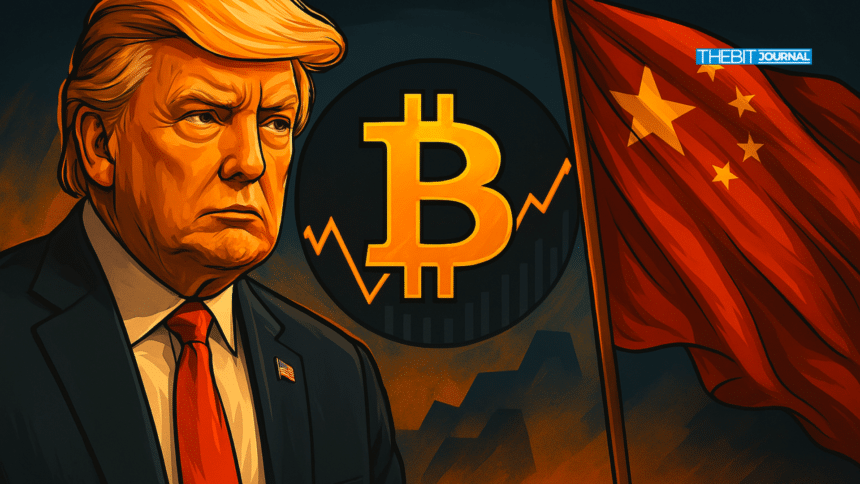The escalating trade tensions between the United States and China have cast a long shadow over global financial markets, with Bitcoin caught in the crossfire. As President Donald Trump intensifies tariffs on Chinese imports, the cryptocurrency market experiences heightened volatility, reflecting investor anxiety and the search for safe-haven assets.
Tariff Turmoil: Bitcoin’s Price Swings Amid Trade Disputes
In early April 2025, Bitcoin’s price plummeted below $76,000 following President Trump’s announcement of a 50% increase in tariffs on Chinese goods, bringing the total levy to 104%. This aggressive move prompted a swift response from China, which imposed an 84% retaliatory tariff on U.S. imports. The tit-for-tat measures have rattled investors, leading to a sell-off in risk assets, including cryptocurrencies.
Despite the initial downturn, Bitcoin briefly rebounded to $83,500 after Trump declared a 90-day pause on tariffs for countries other than China. However, the respite was short-lived, as the ongoing uncertainty surrounding U.S.-China trade relations continued to weigh on market sentiment.

Expert Insights: Navigating the Crypto Market Amid Geopolitical Strife
Analysts offer varying perspectives on Bitcoin’s trajectory amid the trade war. Joe McCann suggests that a potential trade deal with China could trigger a significant market rally.
“If a China deal comes, market explodes. If it doesn’t, it’s already priced. Trump has signaled max pain for China and is willing to negotiate. Market can only re-price higher,” McCann noted.
Conversely, Jeff Park, head of alpha at Bitwise, expresses concern over the weakening Chinese yuan, stating that it could negatively impact risk assets, including Bitcoin.
“With what irreversibly happened with weakened yuan now exporting deflation + 10% tariff creating growth drag, the net outcome is still negative for risk assets especially if 10yr stays above 4%,” Park explained.
Arthur Hayes, founder of BitMEX, adds that continued yuan devaluation might lead to increased money printing by the Federal Reserve, which could ultimately benefit Bitcoin.
“No deal, PBOC continues a very gradual Yuan weakening. Shit ‘bout to get spicy. Luckily, $BTC loves money printing and associated CNY weakness,” Hayes remarked.
Global Implications: Bitcoin’s Role in International Trade
The trade war’s ramifications extend beyond traditional markets, influencing how countries conduct international transactions. Notably, China and Russia have begun settling energy trades using Bitcoin, signaling a shift towards decentralized currencies in response to geopolitical tensions.
This development underscores Bitcoin’s potential as a tool for circumventing traditional financial systems, especially amid economic sanctions and trade barriers. As nations seek alternatives to the U.S. dollar, cryptocurrencies like Bitcoin may gain prominence in global commerce.
Market Outlook: Uncertainty in the Crypto Space
The ongoing trade dispute between the U.S. and China continues to inject volatility into the cryptocurrency market. While some analysts predict a potential rebound for Bitcoin, contingent on diplomatic resolutions, others caution that prolonged tensions could suppress prices further.
Investors are advised to monitor geopolitical developments closely, as policy shifts and economic indicators will likely influence Bitcoin’s performance in the coming months. The interplay between international trade dynamics and cryptocurrency markets remains a critical area of focus for stakeholders navigating this complex landscape.
Conclusion
President Trump’s escalating tariff measures against China have introduced significant volatility into the cryptocurrency market, with Bitcoin experiencing sharp price fluctuations. As geopolitical tensions persist, the crypto community remains vigilant, assessing the implications of international trade policies on digital assets. While uncertainties abound, Bitcoin’s role as a decentralized currency continues to evolve, potentially offering a hedge against traditional market disruptions.
FAQs
Q: How have Trump’s tariffs impacted Bitcoin’s price?
A: The imposition of increased tariffs on Chinese imports has led to heightened market volatility, causing Bitcoin’s price to fluctuate significantly amid investor uncertainty.
Q: Could Bitcoin benefit from the U.S.-China trade war?
A: Some analysts suggest that prolonged trade tensions and potential devaluation of traditional currencies might enhance Bitcoin’s appeal as a decentralized asset.
Q: Are other countries adopting Bitcoin for international trade?
A: Yes, reports indicate that China and Russia have initiated energy trades settled in Bitcoin, reflecting a shift towards cryptocurrency in global transactions.
Q: What should investors watch for in the crypto market amid trade tensions?
A: Investors should monitor geopolitical developments, currency fluctuations, and central bank policies, as these factors can significantly influence cryptocurrency markets.
Glossary of Key Terms
Tariff: A tax imposed by a government on imported goods, often used to protect domestic industries or as a tool in trade negotiations.
Cryptocurrency: A digital or virtual currency that uses cryptography for security and operates independently of a central bank.
Devaluation: A reduction in the value of a country’s currency relative to other currencies, often to boost exports by making them cheaper on the global market.
Safe-haven asset: An investment that is expected to retain or increase in value during times of market turbulence, such as gold or certain government bonds.
Volatility: A statistical measure of the dispersion of returns for a given security or market index, often associated with the degree of variation in trading prices.






























